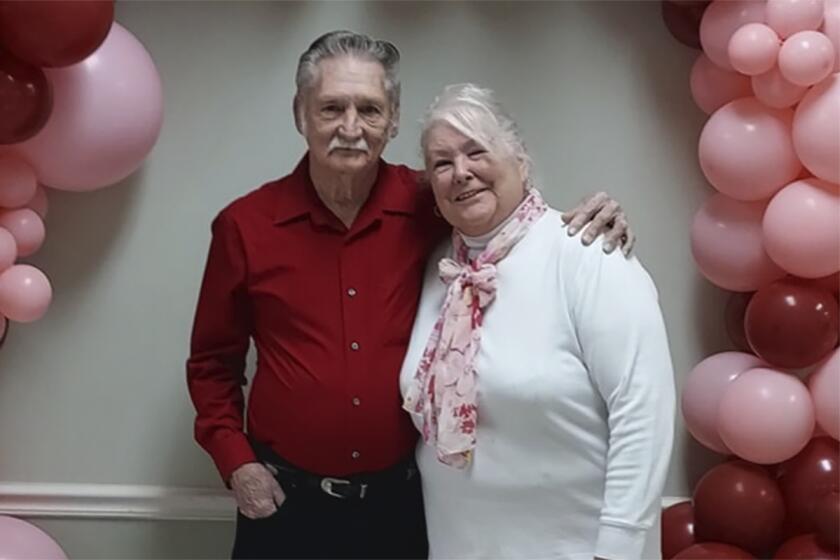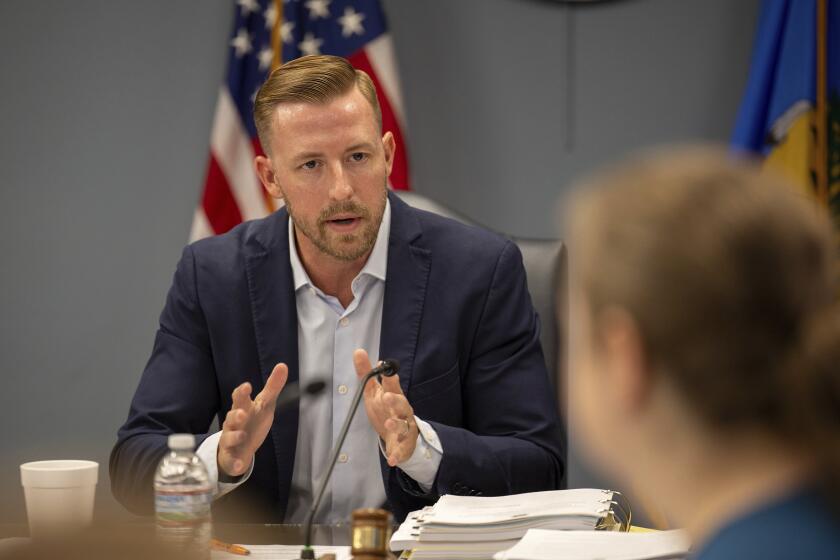Aspin Expected to Urge Policy of Secrecy for Gays
Defense Secretary Les Aspin, reflecting the dominant view among the military’s top brass, this morning is expected to urge President Clinton to open the military to gay men and women only if they keep their sexual orientation a secret.
Clinton Administration officials said that the Aspin recommendation--a restrictive version of a compromise widely known as “don’t ask/don’t tell”--appeared to be gaining favor in the White House as well. Clinton advisers George Stephanopoulos and David Gergen met Wednesday with Aspin at the Pentagon to go over final details.
Delivery of Aspin’s recommendation, the result of lengthy consultation with the six members of the Joint Chiefs of Staff, moves the explosive issue back to the Oval Office. After seven months of political wrangling and indecision, of congressional hearings and high-level military consultations, the decision over lifting the military’s longstanding ban on homosexuals now moves inescapably to Clinton.
On the eve of the recommendation, however, Clinton continued to defer to the Pentagon in questions relating to the controversy.
“My sense is there’s still some difference of opinion even among the service chiefs on what they want,” he said in an interview Wednesday with CNN. “But I hope they will come up with something that everyone can agree is fair and that we can all live with. We’ll just have to see.”
Asked how long it would take him to make his decision after reviewing the recommendation, he replied: “It won’t take long. It won’t take long at all.”
White House aides said that as soon as possible after receiving the Pentagon’s recommendation--perhaps as early as Friday--Clinton may announce his decision. However, White House officials have told lawmakers that the controversial decision could be issued as a directive from the Pentagon rather than as a White House announcement--a move designed to minimize the apparent significance of Clinton’s role.
In finalizing his decision, Clinton hopes to put an end to the issue that has roiled his relations with Congress and the military and strained his ties with gay activists, who overwhelmingly supported his election.
Aspin’s recommendation, if approved by the President, would end a 12-year period during which prospective service members have been asked about their sexual orientation, and admitted homosexuals have been barred. But it would largely continue the military’s practice of conducting investigations and dismissing individuals who appear to have engaged in homosexual behavior.
Aspin, again reflecting the preferences of senior military officers, also is expected to propose a change in language describing the Defense Department’s official attitude toward gays. Such language is an important element of the debate, but it is regarded as secondary to the central issue: official policies on the treatment of and actions toward gays.
Under Aspin’s proposal, the phrase “homosexuality is incompatible with military service” would be changed to read: homosexual conduct “has historically been incompatible” with military service, but would add that some gays and lesbians “have served with distinction” in the past.
Administration officials said Aspin also was expected to offer Clinton two additional alternatives to that wording, both of which would be more acceptable to gay-rights activists.
One option would eliminate the current language altogether. The other would state that “the military has always believed that homosexuality is incompatible with military service, but recognizes that homosexuals do serve and will continue to serve” in the U.S. military.
Aspin’s agreement to send forward several alternatives to the language is a sign that military leaders consider the point negotiable, according to Pentagon officials and gay activists.
Pentagon officials detailed Aspin’s recommendations Tuesday during a meeting with representatives of the Campaign for Military Service, a prominent gay activist group. Rudy DeLeon, Aspin’s special assistant, and Pentagon general counsel Jamie Gorelick reportedly told gay activists that Aspin had adopted the consensus view of the military chiefs as the only workable solution to redeeming Clinton’s campaign pledge to lift the military’s ban on homosexuals.
The Pentagon officials argued that the policy would represent an improvement in the situation of gays in the military because it would set a higher standard than currently exists for the initiation of an investigation into a service member’s sexual orientation.
Under the Aspin plan, a commander would not be permitted to ask servicemen or servicewomen directly about their sexual orientation. But if the officer is offered “credible evidence” that a service member is engaged in homosexual acts on- or off-base, the officer would be permitted to begin an investigation.
The Aspin policy would give commanding officers broad discretion in determining what constitutes “credible evidence” of homosexuality, according to several gay activists briefed on the plan.
The Pentagon officials reportedly stressed that the standards of proof for ejecting accused homosexuals from the military would remain unchanged. Those do not require proof of actual homosexual activity. Investigators must only establish that a service member has homosexual tendencies.
According to two gay-rights activists briefed on the meeting by participants, Gorelick sought to reassure representatives from the gay activist group that gay service members who are “discreet and lucky” should be able to avoid dismissal from the military under Aspin’s plan.
Like many compromises Clinton has made as President, the one now expected on the issue of gays in the military will likely leave none of the major players happy. Among those least pleased might be Clinton himself, who has learned the hard way that every presidential utterance on the subject sparks a storm of controversy.
Also expected to be displeased are gay and lesbian activists, who maintain that gay service members will be left little better off than they started if Clinton adopts the Pentagon’s recommendation. David Smith, a spokesman for the Campaign for Military Service, vowed that gay activists will fight “in the streets and in the courts” if Clinton bows to Pentagon concerns and adopts the restrictive “don’t ask/don’t tell” policy, as now seems likely.
On Wednesday, lawmakers were told by White House officials that they had no assurances from Sen. Sam Nunn (D-Ga.), chairman of the Armed Services Committee and a skeptic of Clinton’s pledge from the start, that he would not oppose the compromise Aspin will present.
More to Read
Sign up for Essential California
The most important California stories and recommendations in your inbox every morning.
You may occasionally receive promotional content from the Los Angeles Times.











